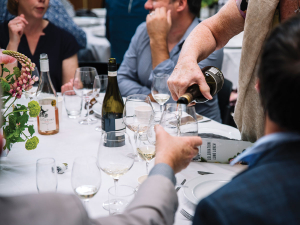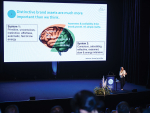One of the biggest mistakes wine marketers make is in assuming consumers are as passionate and knowledgeable about wine as they are.
That was one of the key messages from wine business strategist Lulie Halstead at the New Zealand Winegrowers Business Forum in Christchurch in early November.
“The reality is – and I have had 25 years of direct experience of consumers of wine around the world – they do not care as much as we would like them to,” the Wine Intelligence founder told attendees in a virtual presentation from England. Marketers are prone to projecting their own views, knowledge and desires onto the consumer, “and that gives us a real problem. Because we assume consumers think, feel and behave the way we do”.
That passion-projection was one of a handful of mistakes Lulie warned against, including a common misunderstanding of the components of wine marketing, which begins with knowing the consumer, creating a strategy, and developing tactics, before the final steps of communications and PR.
Another misstep is a belief that focusing on quality alone will lead to meaningful differentiation, she said, reflecting on the common refrain: “I grow wine in a special place; it comes out really high quality; and therefore I am different.” Wine producers across the globe can make the same claim, she said. “That’s not differentiation.”
Lulie advised wine companies to invest in marketing actions that will help drive a profitable wine business, staring with “true consumer understanding”. Operators may be fearful of the cost of consumer research, but there are plenty of ways to gain insights through time and effort, such as deciphering existing data and how it pertains to a specific business, or getting out and taking notice of consumer behaviour. Sit in a bar and observe what people are buying and drinking, she suggested. Or invite the likes of friends, colleagues, and people in your sports club to come around for lunch, and talk about wine. “Lots of people really like doing that”.
Nurtured and distinctive brand assets were also “super powerful”. Once those things are in place, “think very carefully before you start changing stuff”, she said, cautioning against people new to the industry or a role thinking they need to change everything. “A lot of academic research says you can keep the same positions – the likes of generosity; real beauty – for 30, 40, 50 years in an organisation. I would advocate, let’s stop changing stuff and let’s focus on clear positions, clear distinctive assets, and reiterating the messaging.”
Finally, Lulie advised companies to look at “attitude not age” lamenting wine’s obsession with generations, from Millennials 10 years ago to Zeds today. While it’s necessary to look at changing drinking behaviours, the industry needs to shift its attitude to recognise that attitude can trump age in the industry. People over 50 invest more in travel and premiumisation, but are increasingly ignored, based on demographics, she said.
Lulie sold Wine Intelligence to IWSR in 2021, and is currently a Non-executive Director of the IWSR group. She delivers strategic marketing consultancy, education, interim leadership, and board advisory services to drive profit in wine and spirits businesses. Building on her 30-year experience as a business leader in global wine and an academic specialising in consumer behaviour, market research, and branding in the wine and spirits sectors, she delivers masterclasses tailored to support individual wine businesses and regional associations. She was recently appointed as the Interim Chief Executive of the Gerard Basset Foundation which to date has pledged £2.2 million to support diversity and inclusion projects globally in wine, spirits and hospitality.











